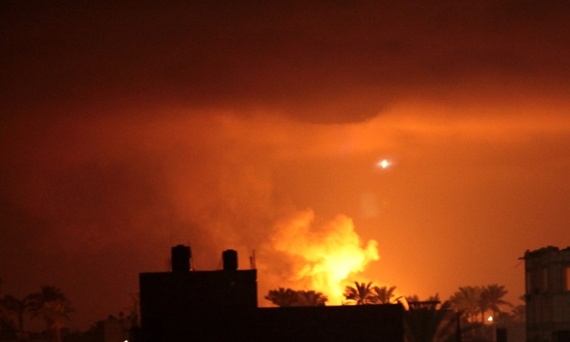
The circumstances on the ground in the land between the Mediterranean Sea and the Jordan River are as combustible and dangerous as we have seen is quite some time.
The Israeli-Palestinian peace process is for all intents and purposes as dead as disco. Israeli Prime Minister Benjamin Netanyahu has about the same personal relationship with Palestinian Authority President Mahmoud Abbas as Ariel Sharon had with Yasser Arafat before the longtime PA chairman died. President Barack Obama's special envoy for Israeli-Palestinian negotiations, Ambassador Martin Indyk, would rather return to his foreign policy perch at the Brookings Institution than continue in a dead-end job that has outlived its usefulness.
On the ground, Israelis and Palestinians on the extremist fringe are beginning to take matters into their own hands. Three Israeli teenagers and a 16-year old Palestinian were dumped in remote areas after their kidnappers sadistically murdered them in what can only be called hate-crimes. And, to make matters even worse, the Israel Defense Forces and the military wing of Hamas, the Izz ad-Din al-Qassam brigades, are trading rocket fire and air strikes in each other's territory. The Times of Israel has reported IDF sources as saying that 40 rockets have been fired into southern Israel on Sunday and the early portion of Monday; Israel has responded with dozens of air strikes on Hamas infrastructure in Gaza, purportedly resulting in the deaths of seven Hamas militants.
Not to sound too dramatic, but the flames are getting bigger and they may explode into yet another round of intense clashes between Israeli soldiers and Hamas fighters along the Israel-Gaza border. Hamas has vowed revenge for the killing of their seven comrades -- a threat that, if carried out, could potentially frighten Israelis as far as Jerusalem to run to the bomb shelters.
We have seen this movie way too many times before. In December 2008 to January 2009, Hamas rocket fire on Israeli towns along the Gaza border prompted the IDF to launch its biggest military offensive against the Palestinian militant group since the end of the Second Intifada. That operation caused uproar in much of the international community over Israeli tactics, but the goal of stopping the rockets from falling on Israeli territory was largely achieved. That is, until November 2012, when the Israeli air force again had to "mow the grass" in Gaza. Hundreds of Hamas installations were destroyed before both sides again struck a formal ceasefire arrangement where "quiet was met with quiet." Now that Israel has officially launched a third IDF operation in Gaza in six years -- according to the IDF's official Twitter account, this one is called "Operation Protective Edge" -- we can expect the military activity to stop in a similar way. It may take a few days of cross-border violence, but deterrence will be re-established and the Israel-Hamas standoff will strike a tenuous balance (that is, until Hamas, Islamic Jihad, or one of the small Salafist groups in Gaza provokes one more conflict).
U.S. officials are cautioning restraint on all sides in the hope of averting a potential full-scale conflict, including the introduction of Israeli ground troops into the Palestinian enclave. U.N. Secretary-General Ban Ki-moon, in an op-ed for Haaretz, has issued a similar call. "It is justice we now need,"Ban writes, "not revenge."
The question looming over everyone is whether Netanyahu, Khaled Meshal, Ismail Haniyeh, and Mahmoud Abbas can collectively come to the same conclusion. The U.S., Egypt, the U.N., Qatar, and the rest of the Arab world will all try to calm the situation in Gaza to ensure that the lives of Israelis and Palestinians are protected, but ultimately, it's up to the main players of the game to act like responsible adults for the sake of their people.

